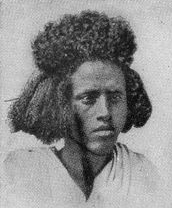Hadendoa
The Hadendoa ( Hadendowa ) are an ethnic group in the north-east of Sudan , in the Elba protected area in southern Egypt and in northern Eritrea . They are a subgroup of the Bedscha and their language is the Hadendoa dialect of the Bedawi . The Hadendoa were known to be warlike.
designation
The name Hadendoa ( Haɖanɖiwa ) is said to come from haɖa (lion) and (n) ɖiwa (clan). "Fuzzy Wuzzy" is a term coined by the English occupiers at the time of the Mahdi uprising (1881–1899) for the Hadendoa, which until the 1970s also stood for a warlike tribe in the Sudan area in the German-speaking area. The Hadendoa were probably named because of their striking hairstyle (English fuzzy here about "curly, wuschelig"). The word is expected on the long, curly and point with butter coiffed hair, which is not excluded that ghazi, the Arabic word for "warrior", the English fuzzy verballhornt was.
history
The Bedscha supported the Mahdi in the war against the British. Bedjah are divided into several tribes. One of them are the Hadendoa, nomads who live on the Sudanese coast on the Red Sea . They had large cavalry and armed infantry troops . The slave trader and insurgent leader Osman Digna was a Hadendoa. Many of them had had good military training in the Egyptian army.
Others
In the English-speaking world, the Fuzzy Wuzzies became known through Rudyard Kipling's poem about the Mahdi uprising. They still appear in a popular British nursery rhyme today. Also in the British sitcom Dad's Army one of the main characters tells of his adventures as a soldier under "Soldier with the Fuzzy Wuzzies". During World War II , Australians with a similar hairstyle who supported their army, called the Papua New Guinea indigenous people Fuzzy Wuzzy Angels.
credentials
-
↑ Wikisource: en: "Fuzzy-Wuzzy" - sources and full texts
Web links
- MA Mohamed Salih: Symbolic Identification among the Hadendowa of Eastern Sudan. In: Gísli Pálsson (Ed.): From Water to World-Making: African Models and Arid Lands. Scandinavian Institute of African Studies, Uppsala 1990, pp. 109-120
- The nomads of Nubia. ZDF, August 31, 2004
